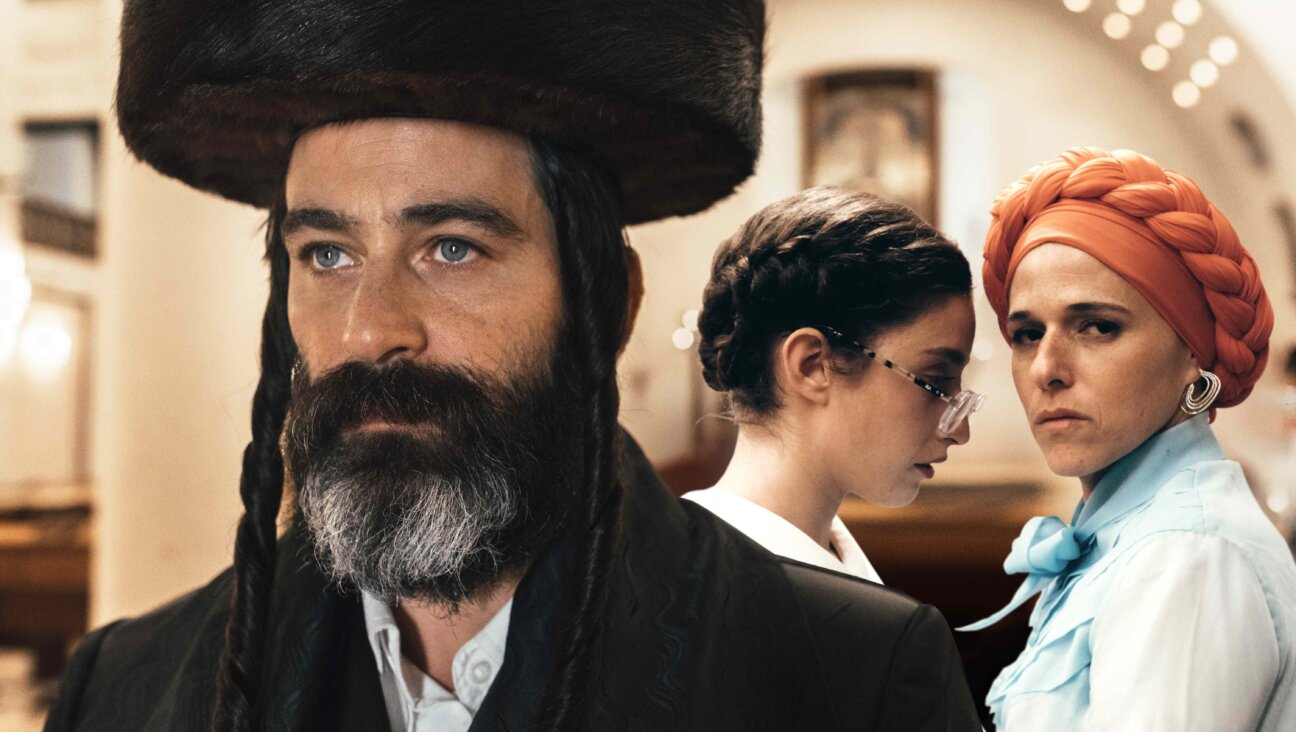50 Shades of Joel Grey

Shades of Grey: Joel Grey in his 1972 Oscar-winning performance in “Cabaret.” Image by Allied Arts Pictures Corporation
Joel Grey understands why it comes up in every interview. “People want to grab attention and that’s what this year’s news was,” he says.
The “it” has to do with his coming out to People Magazine last year. And the reason it remains this year’s news is because of Grey’s just-published, no-holds-barred memoir, “Master of Ceremonies” (Flatiron Books, $27.99), which features a cover photo of the star in make up for his signature role, the emcee at the Kit Kat Club. He played it in both the stage and film versions of the musical “Cabaret,” earning him both a Tony and Oscar.
But as his book reveals, professional successes aside, it was a life of considerable personal struggle. Grey knew he was different early on; yet, not surprisingly, given the times, he had difficulty coming to grips with what that meant and how to deal with it.
While still in elementary school, he had a relationship, with the teenage elevator operator in the residential hotel where his family lived. At age 12 there was another with a fellow child actor.
And he was just 16 years old when he began an affair with the cantor at the Westside Jewish Congregation in Los Angeles. What was most hurtful occurred when he eventually confessed the affair (which at one point included the cantor’s wife) to his parents. His mother recoiled from him and said: “Don’t ever touch me again. You disgust me.”
It was a traumatic moment that took him many years to get over. “I realize now my mother was a child herself and incapable of being a complete parent. Am I angry? No. I have been, but I am no longer. My mother wasn’t a bad person.”
When I suggest that the pedophile cantor was evil, Grey disagrees. Evil is in the eye of the beholder. “I didn’t think so,” says Grey who maintains that he was a willing participant. “I thought he was fantastic.”
Born Joel Katz in Cleveland, he found his life’s passion when he was just nine years old. His mother took him to see a performance at the Cleveland Play House. Grey doesn’t remember what show he saw, but recalls that he was immediately entranced. He told his mom “I want to do that,” and was promptly enrolled in a drama class that was part of the theater’s children’s program.
He soon graduated from the children’s program to the main stage, where he became a regular, the go-to child actor.
In addition to finding his life’s passion early on, Grey was lucky, too, because his father, Mickey, was extremely supportive. “My father was a very generous and understanding and broad minded humanist and” — here he chuckles — “so what was he doing with my mother? He just fell hard for her when he was 19 and she was 16. There was no rhyme or reason why he stayed expect that was enchanted with her despite her negative aspects. He was always on my side and always a person who was considerate and intelligent. My mom was kind of not that. She operated on a much more visceral level.”
In addition to emotional support, dad provided early impetus to Joel’s career. He was the Mickey Katz who became famous first as a member of the Spike Jones Orchestra (which prompted the family’s move to Los Angeles) and subsequently as a star on his own, creating the “Borscht Capades” and writing popular Yiddish parodies such as “Haim Aufen Range” (Home on the Range), “Barber of Schlemiel,” and “She’ll be Coming ‘Round the Katzkills.”
Mickey added his son to the “Borscht Capades” bill and young Joel was an instant hit. It was around this time that another Cantor entered his life. Pop-eyed comedian Eddie Cantor saw Borscht Capades, gave Joel a spot on his national TV show, The Colgate Comedy Hour, and then helped provide entree into the important William Morris Agency.
What followed was success, first as a nightclub headliner, then in films and finally the stage. Yet, Grey still felt incomplete. That changed, at least somewhat, wile furniture shopping, he was introduced to Jo Wilder, an actress.
They’d actually met briefly once before (she didn’t recall), and Grey was immediately entranced. Grey always dated women, searching for a wife and perspective mother. In Wilder, he found her. They dated briefly and wed in 1958.
It was a tempestuous marriage, where they argued largely about her career. He wanted her home, and if not barefoot, pregnant with child. In retrospect, he admits he was something of a bully and far from supportive. In fact, once when she was appearing in a play in Chicago, he flew out from New York with his dirty laundry for her to wash.
“In my defense,” he says now, “I never officially asked her to do it.”
That marriage produced actor Jennifer and adopted son James, a chef, and, at least for me, some questions. I wondered if he was acting the part of straight husband, and he said no:
“It was the life I was leading. I was not play acting. I was a full husband and father. It was something I was best at and some of the best things I ever did. I was living fully in the moment in germs of my situation of being a father with kids and a wife I was mad about and a career I enjoyed.”
Encouraged by his therapist, Joel came clean about his history to wife Jo, assuring her it was all a thing of the past. But the news proved too much for her and shortly thereafter she filed for divorce. Knowing what he knows now, would he confess again? Yes.
“We had 24 mostly amazing years and so many marriages don’t last longer than that.”
But, then, why gay? Why not say bi? “Because I’m clear in my attraction. My belief in who I am is not that (bi). But it doesn’t mean I couldn’t meet a woman and love her again. It’s not black and white.”
Nevertheless, Grey felt it important enough to come out last at age 82. “It was not something that was a problem for me in that everybody I knew and loved knew who I was. Ultimately, the only reason to make a bigger statement was because the times have changed and I felt responsible in terms of if my story helped someone who is confused or troubled or didn’t know where they belong, if this could help one person, why not?”
Curt Schleier writes about the entertainment industry for the Forward.

I hope you appreciated this article. Before you go, I’d like to ask you to please support the Forward’s award-winning journalism this Passover.
In this age of misinformation, our work is needed like never before. We report on the news that matters most to American Jews, driven by truth, not ideology.
At a time when newsrooms are closing or cutting back, the Forward has removed its paywall. That means for the first time in our 126-year history, Forward journalism is free to everyone, everywhere. With an ongoing war, rising antisemitism, and a flood of disinformation that may affect the upcoming election, we believe that free and open access to Jewish journalism is imperative.
Readers like you make it all possible. Right now, we’re in the middle of our Passover Pledge Drive and we still need 300 people to step up and make a gift to sustain our trustworthy, independent journalism.
Make a gift of any size and become a Forward member today. You’ll support our mission to tell the American Jewish story fully and fairly.
— Rachel Fishman Feddersen, Publisher and CEO
Join our mission to tell the Jewish story fully and fairly.
Only 300 more gifts needed by April 30
























